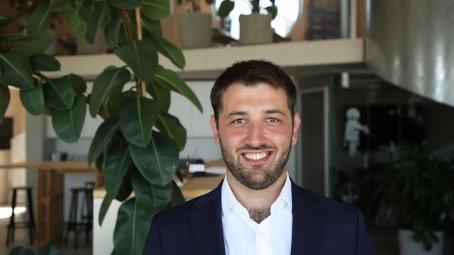Panagiotis Martakis: Critical infrastructure maintenance 2.0

Dr. Panagiotis Martakis trained as a civil engineer, earning his MSc in Structural and Geotechnical Engineering at ETH Zurich before completing a PhD in Artificial Intelligence for Structural Health Monitoring. Following his master’s degree, he spent several years working as a professional structural engineer in the field, where he experienced firsthand how infrastructure maintenance still relies on periodic visual inspections and engineering assumptions. “The way we operate as civil engineers hasn’t changed much in the past 50 years,” he explains. His curiosity eventually brought him back to ETH, where his research merged sensors, signal processing, and machine learning to assess the structural health of infrastructure. He envisioned what he calls a “smartwatch for engineers”, a system that listens to the subtle vibrations of infrastructure and translates them into actionable insights for predictive maintenance.
Bridging research and practice
During his doctoral research, Panagiotis realized the value of real-world data to verify scientific hypotheses and validate assumptions. To ground the concept in reality, he collaborated closely with asset owners and engineering firms, testing data-driven approaches for structural assessment. His key insight was that the true value didn’t lie in the hardware itself, but in how measurements can be translated into actionable metrics. That emphasis on interpretation would later form the cornerstone of Irmos technologies.
Founding Irmos and securing the first contract
The founders of irmos are former researchers from ETH Zurich. They decided to bring their work out of the lab and into the real world by founding an ETH spin-off. As Panagiotis recalls, the company was incorporated only after their first monitoring contract was secured: “We technically incorporated after having the first client; there was a contract on the table, and then we incorporated.” Securing a long-term monitoring contract so early gave the young company instant credibility—and the revenue to grow from day one.
From pilot projects to product
Irmos technologies combines cost-efficient sensors with cloud-based analytics to translate vibrations into structural indicators. By continuously listening to the ‘heartbeat’ of a structure, Irmos enables infrastructure owners to spot deterioration early and plan maintenance before problems escalate. The company has built datasets from both healthy and damaged structures and validated its algorithmic backend across more than a dozen buildings and bridges.
Why it matters
In Switzerland and Europe, much of the critical infrastructure was built in a concentrated wave during the second half of the 20th century. Now, many of these assets are simultaneously approaching the end of their operational lifespan. Traditional inspections are subjective and infrequent, often leading to costly over-maintenance or sudden failures. A real-time, data-driven monitoring system improves both safety and sustainability: it safely extends the lifespan of existing assets, reduces the need for energy-intensive replacements, and helps prioritize maintenance budgets.
Awards and recognition
Irmos’ potential has been widely recognized within Switzerland’s innovation ecosystem. Shortly after incorporating, the startup received financial support from Venture Kick, the Gebert Rüf foundation and the SNF Grant “BRIDGE Proof of Concept”. In 2024 Irmos received financial support from Innosuisse through the Startup Innovation Project and won multiple startup awards, such as the Swiss Innovation Challenge, the Swiss Sustainability Challenge, the Swiss Excellence Product Award and was among the top three winners of the ZKB Pioneer Prize. Internationally, Irmos leveraged multiple Swissnex internationalization camps to explore markets in Europe, Asia, and the US and was member of the Swiss National Startup team of Venture Leaders that attended the Mobile World Congress in Barcelona (2024). Irmos won the DB Mindbox competition in Berlin, organized by Deutsche Bahn, Sacyr’s iChallenge in Spain, and the European Startup Prize for Mobility, awarded by Die Autobahn GmbH in Brussels. These successes triggered pilot projects with the Port Authority of New York and New Jersey and with Die Autobahn Gmbh in Germany, now expanding to commercial agreements.
Business model and customer engagement
Irmos follows a value-based business model. Through minimizing costs for instrumentation and hardware, the company monetizes the value generated to the client through intelligent analytics. Crucially, Irmos product development is driven by customer feedback. When meeting a new client, Panagiotis and his team start by asking the question: What’s your most challenging bridge? Only after understanding the specific pain points do they showcase how Irmos’ technology can deliver value. This consultative approach builds trust and fosters long-term adoption.
Leadership philosophy and culture
Panagiotis leads Irmos with a philosophy that is both data-driven and human-centered. He believes that successful entrepreneurs must remain flexible and coachable, ready to adjust courses as new information emerges. He describes startup life as a rhythm of broad exploration followed by sharp focus—the real art, he says, is knowing when and where to focus. Team alignment is equally important. “At this stage, our most precious resource the team,” Panagiotis notes, highlighting how crucial it is to build a cohesive group of engineers, data scientists, and business developers. Irmos is proud to have built an inclusive team located in Switzerland, spanning across six nationalities and actively fostering a culture where all voices contribute meaningfully to innovation and decision-making. That culture of transparency, Panagiotis says, is what fosters trust and resilience.
Outlook
Irmos has rapidly evolved from a research prototype into a scalable product. Its founders anticipate strong growth as the shortcomings of conventional infrastructure maintenance approaches are becoming increasingly apparent.
Irmos technologies has the ambition to become a global player in infrastructure monitoring and revolutionize the industry. With a proven contract base in central Europe, the company is now exploring opportunities worldwide

